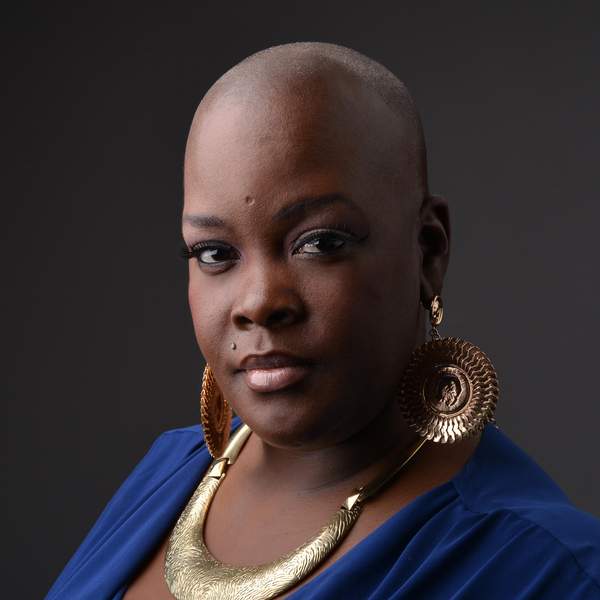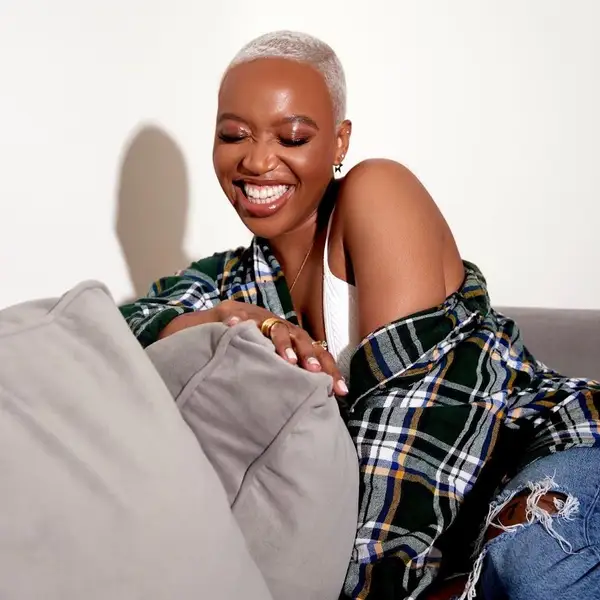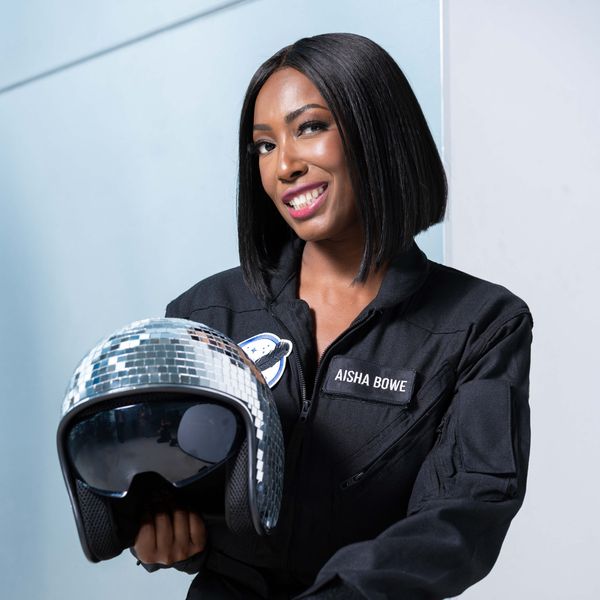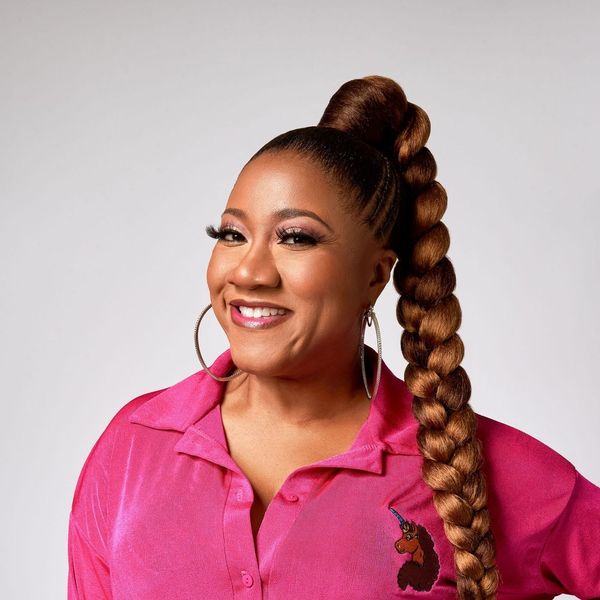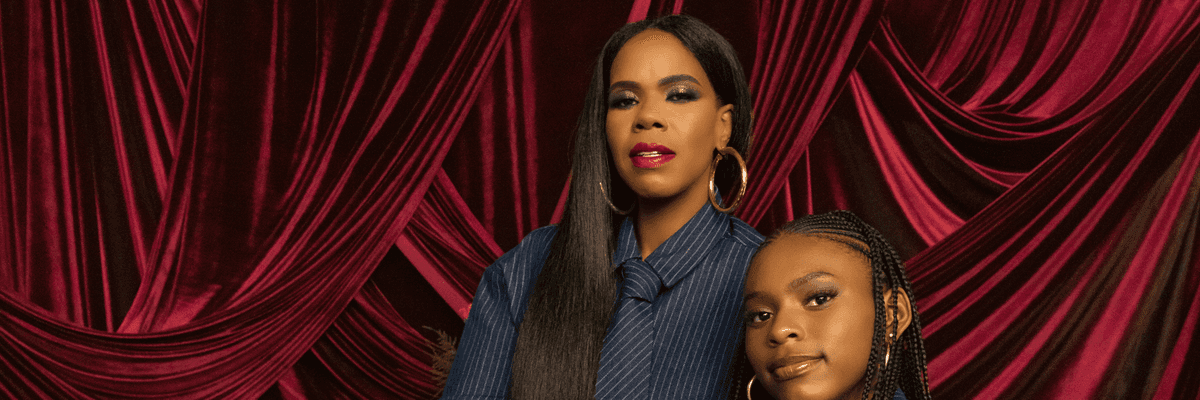If a breath of fresh air was a person, it would be Sonya Renee Taylor. Even via our Zoom call, the poet, best-selling author, and social justice advocate exudes that perfect mix of grace, intellect, and tell-it-like-it-is candor of your favorite auntie or podcast host. Taylor, who started The Body Is Not An Apology movement in 2011 and wrote The New York Times best-seller The Body Is Not An Apology: The Power of Radical Self-Love in 2018, has used her voice and platform to create a profound safe space, and drive a movement behind being unapologetically yourself as a Black woman and embracing all that comes with that journey.
Sonya has also powerfully taken on the dismantling of systems set up in the U.S. that support body-based oppression and stifle true "radical self-love," stepping beyond shame and so-called societal "norms" of what being a woman supposedly should be and into inner transformation that blossoms divinely. I had a conversation with Taylor that not only blessed my soul—and reaffirmed my own journey toward self-love— about what exactly “radical self-love” means, how concepts of body positivity have evolved—or not—and how we, as Black women, can take back our power to define womanhood on our own terms.
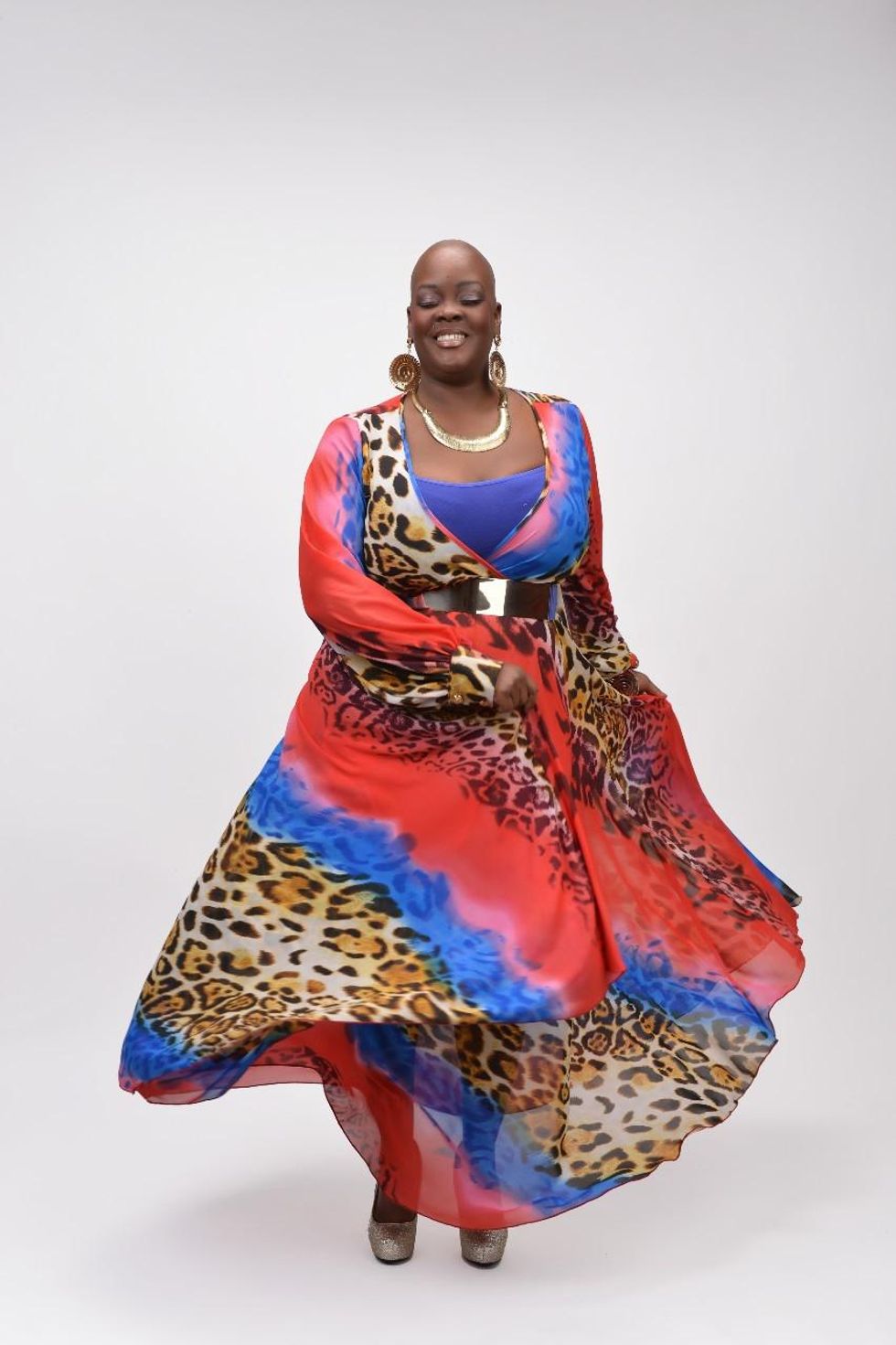
Courtesy of Sonya Renee Taylor
xoNecole: So, you've been a fierce advocate for 'radical' self-love, and your poetry as well as your platform have seen global recognition. You've touched so many people. How did the idea for your platform and book, 'The Body Is Not An Apology,' come about?
Sonya Renee Taylor: From a place of love. I’d asked my friend about her sexual health choices and why she wasn’t using protection with this person that I knew was a casual partner. And my friend responded very honestly–very transparently—and shared that because of her disability–she has cerebral palsy—that she felt it made it difficult already to be sexual so she didn’t feel entitled to ask this person to use a condom.
xoNecole: Oh wow...no!
SRT: And my immediate response—that I’m very clear today, was through me, not of me—I said, "Your body is not an apology. It’s not something you offer someone to say, 'Sorry for my disability.'" And those words resonated. They stuck for me. They felt like I wasn’t just sharing a message with a friend. I also was communicating something that I needed to know too, and you know, at the time I was a poet and so when something particularly compelling showed up, I wrote about it. I was going to write the poem with this refrain, “The body is not an apology.” So I wrote that poem, and I began performing it and sharing it.
I believe that language is always making things manifest, so what we speak over our lives always comes into being—good, bad, or indifferent. And so those words—the words I had written in this poem–started challenging me to look at the places where I was still living like my own body was an apology. In a small way, a few months prior, I’d taken a photo of myself—a selfie in a black corset—and I felt sexy and delicious. I also felt like I didn’t have a right to feel sexy and delicious in this fat, dark-skin body and so I hid the picture away until February 9, 2011.
"I believe that language is always making things manifest, so what we speak over our lives always comes into being—good, bad, or indifferent."
Prompted by someone who posted a photo of a plus-sized model, naked, on my Instagram page, I went and googled her quickly and one of the first ads that came up was with her in a black corset for a lingerie campaign. I just felt inspired. Why am I hiding this thing that I feel good about? What would it look like if I just posted this picture? So I posted it and asked people on Facebook, "Post a picture where you feel beautiful and powerful in your body." The next day about 30 people had tagged me in photos. I was like, ‘Maybe we just need a little space where we’re allowed to affirm ourselves and each other. So maybe I’ll start a little Facebook page and I’ll name it after this poem, and I’ll call it, ‘Your Body Is Not An Apology.’'
So, I started a Facebook page and that was 11 years ago, a New York Times best-seller-ago and a multimedia company ago.
xoNecole: That's amazing! There are a lot of women who feel like they have to dishonor themselves in order to appease a partner sexually. I love that you were that friend. Now tell me this: How has the concept of self-love evolved for you today, considering your success and considering that body positivity and self-love now seem to be trending topics. What have you seen in terms of evolution, if any?
SRT: I think that part of the reason the word ‘radical’ ended up on self-love—when I started this 11 years ago, there were less than one page of hits on the page of ‘radical self-love—it was me and one other person. [Laughs] At the time, I was really talking about body empowerment and how we honor all bodies. What’s happened over time, for me, it’s become very clear that our relationship to self-worth— to our sense of enoughness—filters into every aspect of existence. And not just our existence but everybody’s existence. This thing we think of as this very individual experience that we’re having by ourselves—in how we relate to our body—actually has global, political, and socioeconomic consequences.
‘Radical’ is so important in self-love because I want people to make the connection that I’m talking about a kind of love that changes systems, that I’m talking about a kind of love that transforms policies, that transforms institutions. I’m talking about a kind of love that transforms how we show up in the world, which consequently changes how the world exists. And I have seen, over and over again in my own life, that when I am connected to [and] moving from my own radical self-love, I am looking at how the world has said I’m supposed to experience being this fat, Black, bald, queer, neurodivergent woman—what the world says that’s supposed to mean—versus what I inherently understand what my true self knows about that, which is that each and every aspect of me is divine and that when I buy into what the system has told me to buy into about that, that I reinforce all of those negative aspects of the system.
"It’s become very clear that our relationship to self-worth— to our sense of enoughness—filters into every aspect of existence. And not just our existence but everybody’s existence. This thing we think of as this very individual experience that we’re having by ourselves—in how we relate to our body—actually has global, political, and socioeconomic consequences."
If I listen to what the world says about being a dark-skinned Black woman, I immediately become an agent of anti-Blackness. I immediately become an agent of white supremacist delusion. When I believe what the world tells me about my fat body, I immediately become an agent of fatphobia. And so, all of those systems stand because so many of us have been indoctrinated to be agents for them, knowingly and unknowingly. So, every time I tap into my own radical self-love, I divest from that job I was given, that I didn’t even know I was given, to keep furthering those systems.
And I think that that is where body positivity misses the boat because body positivity has been co-opted and turned into this incredibly apolitical thing. Body positivity was born out of the fat liberation movement of the ‘70s, which was started by queer women, disabled communities, and people of color, and it was co-opted so that white ladies could feel good in their size 14 jeans. That’s cute. I want that for people, I suppose.
I don’t want you to feel terrible about yourself, but how does that impact the wage gap for Black women? How does that stop extra-judicial killing by the police? It doesn’t, and the radical self-love I’m talking about interrupts those systems, interrupts those ideas that there are bodies that are not worthy of resources, opportunity, and life. And so, consequently, we devalue those bodies. [Transforming that system is] what radical self-love does. And to me, that’s an inherently political act.
xoNecole: So let's talk more about redefining 'woman' in that context then. Oftentimes, being a Black woman, we were raised with concepts and issues with our bodies, from our grandmas to our moms to our aunties. For me, I grew up tall and slim, so anything above a size 6 was said to be "fat" in a negative way in my family. How do we as Black women really embrace 'radical' self-love, especially considering some of the things we've been taught about ourselves?
SRT: One of the things I advocate for is that first, we have to understand where those [negative messages] come from. Oftentimes we think that we created them. Like, ‘I have this judgment about myself, this thing that popped up in my head,’ or ‘I have this judgment about myself and the boy in 8th grade gave it to me or my grandmama gave it to me.’ So we have this very centralized focus of responsibility. I encourage people to zoom the lens out and to understand that it’s an individual experience they’re having inside of a larger context of systems and structures. Your grandmother got the message that ‘fat’ was bad. Where did she get that message from?
She got it from a campaign that started in the 19th century, the late 1800s, right after the abolition of slavery, where white people needed to figure out new ways to reconstruct their power. They needed to figure out ways to reaffirm their superiority. Dieting and control of the body became that new way. And we know about this because, in the book Fearing the Black Body by Sophia Strings, she talks about the historical and racial origins of fatphobia. So that wasn’t an idea your grandma just came up with. It was an idea inside a larger system—a system we call white supremacy, inside of what I call white supremacist delusion. I don’t want to get it twisted. Inside of that system is another doll—that doll is called fatphobia. And then, inside of that system, there are communities who pass on, and become unwitting agents of that system because they’ve been told these messages.
If you can get [to] that larger level, you can recognize that these ideas are not my ideas. They are the ideas of a larger system that’s designed to control me and manipulate me, that’s designed to further marginalize and oppress me. I don’t want to be an agent of that. So, then what do I do? I start raising the consciousness and I start taking new action based off of that awareness. “Well, this is what I used to do, based on that indoctrination. What can I do now? Well, maybe I could make a little money jar, and every time I say something fatphobic about myself, I put a little something in there.” That’s my reminder to invest in myself and divest from that system.
There are small little activities we can do to help interrupt old patterns—those old stories of womanhood that often come out of those systems, but it’s important to recognize that it was the system that told us that. It’s not our authentic self. Authentic self understands our inherent worthiness.
xoNecole: A lot of us look in the mirror and see those delusions. I've never outlived the negative feelings of my Granny calling me "fat" when I gained any amount of weight. It makes you feel like you're not enough. It's taken me decades to undo the effects of that, with therapy as well. Are you an advocate of therapy as a resource to tap into that 'radical' self-love?
SRT: Absolutely. I'm a wildly unapologetic advocate of therapy. My therapist is my longest relationship. We’ve been together for 10 years. So one of the things I think particularly Black women need to give themselves permission to do is to invest in ourselves. We’ve been so conditioned to take care of everybody else—to take care of everybody else’s well-being, to look out for everyone else. And what I am a profound advocate of is that it’s of no use to anyone to give from a dwindling cup.
What I give from is my overflow and I give from my overflow for two reasons: One, what’s in my cup belongs to me. That’s how I sustain myself. So what you give is more vibrant and more beautiful from overflow. And two, I am not doing anyone any favors—I’m not actually offering the world a real gift to, like, have my backwash or the dribble at the bottom of my cup. I make sure that my cup is full first so that whatever it is I’m giving is a generous and joyful gift to the world and that, to me, relates to therapy or whatever healing modalities that we decide to undertake.
"What I give from is my overflow and I give from my overflow for two reasons: One, what’s in my cup belongs to me. That’s how I sustain myself. So what you give is more vibrant and more beautiful from overflow. And two, I am not doing anyone any favors—I’m not actually offering the world a real gift to, like, have my backwash or the dribble at the bottom of my cup. I make sure that my cup is full first so that whatever it is I’m giving is a generous and joyful gift to the world and that, to me, relates to therapy or whatever healing modalities that we decide to undertake."
First, let me learn to take good, good, good, good, good care of me. Because, one, so that I can give a fantastic instruction guide for whoever else shows up and says they want to do the job, and, two, so that when I’m offering something to the world, it never has the bitter taste of resentment and it never has the flavorlessness of exhaustion. It doesn’t have any of those qualities because it’s so full of what it is that I, first, offer myself.
Find out more about Sonya Renee Taylor and The Body Is Not An Apology via her Instagram or website.
Featured image courtesy of Sonya Renee Taylor



